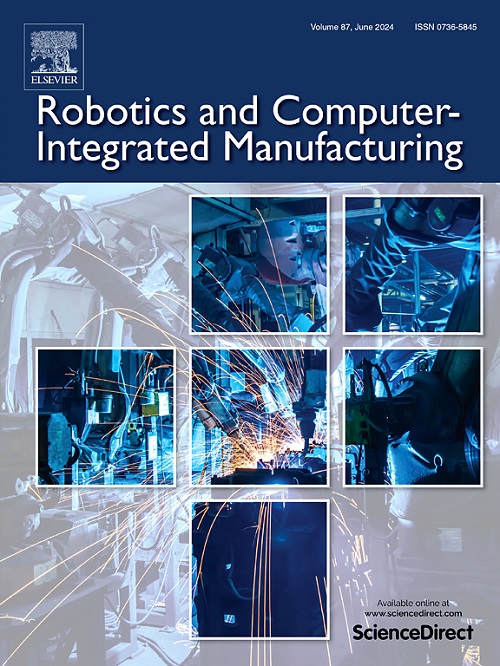Variable impedance control on contact-rich manipulation of a collaborative industrial mobile manipulator: An imitation learning approach
IF 9.1
1区 计算机科学
Q1 COMPUTER SCIENCE, INTERDISCIPLINARY APPLICATIONS
引用次数: 0
Abstract
Variable impedance control (VIC) endows robots with the ability to adjust their compliance, enhancing safety and adaptability in contact-rich tasks. However, determining suitable variable impedance parameters for specific tasks remains challenging. To address this challenge, this paper proposes an imitation learning-based VIC policy that employs observations integrated with RGBD and force/torque (F/T) data enabling a collaborative mobile manipulator to execute contact-rich tasks by learning from human demonstrations. The VIC policy is learned through training the robot in a customized simulation environment, utilizing an inverse reinforcement learning (IRL) algorithm. High-dimensional demonstration data is encoded by integrating a 16-layer convolutional neural network (CNN) into the IRL environment. To minimize the sim-to-real gap, contact dynamic parameters in the training environment are calibrated. Then, the learning-based VIC policy is comprehensively trained in the customized environment and its transferability is validated through an industrial production case involving a high precision peg-in-hole task using a collaborative mobile manipulator. The training and testing results indicate that the proposed imitation learning-based VIC policy ensures robust performance for contact-rich tasks.
可变阻抗控制协作式工业移动机械手的丰富接触操作:模仿学习法
可变阻抗控制(VIC)赋予机器人调整顺应性的能力,提高了机器人在多接触任务中的安全性和适应性。然而,为特定任务确定合适的可变阻抗参数仍然具有挑战性。为了应对这一挑战,本文提出了一种基于模仿学习的可变阻抗控制策略,该策略采用与 RGBD 和力/力矩(F/T)数据相结合的观察结果,使协作式移动机械手能够通过学习人类示范来执行接触丰富的任务。VIC 策略是通过在定制的模拟环境中训练机器人,并利用反强化学习(IRL)算法来学习的。通过将 16 层卷积神经网络 (CNN) 集成到 IRL 环境中,对高维演示数据进行编码。为了尽量缩小模拟与真实之间的差距,对训练环境中的接触动态参数进行了校准。然后,在定制环境中全面训练基于学习的 VIC 策略,并通过使用协作移动机械手执行高精度钉入孔任务的工业生产案例验证其可移植性。训练和测试结果表明,所提出的基于模仿学习的虚拟集成电路策略可确保在接触丰富的任务中表现稳健。
本文章由计算机程序翻译,如有差异,请以英文原文为准。
求助全文
约1分钟内获得全文
求助全文
来源期刊
CiteScore
24.10
自引率
13.50%
发文量
160
审稿时长
50 days
期刊介绍:
The journal, Robotics and Computer-Integrated Manufacturing, focuses on sharing research applications that contribute to the development of new or enhanced robotics, manufacturing technologies, and innovative manufacturing strategies that are relevant to industry. Papers that combine theory and experimental validation are preferred, while review papers on current robotics and manufacturing issues are also considered. However, papers on traditional machining processes, modeling and simulation, supply chain management, and resource optimization are generally not within the scope of the journal, as there are more appropriate journals for these topics. Similarly, papers that are overly theoretical or mathematical will be directed to other suitable journals. The journal welcomes original papers in areas such as industrial robotics, human-robot collaboration in manufacturing, cloud-based manufacturing, cyber-physical production systems, big data analytics in manufacturing, smart mechatronics, machine learning, adaptive and sustainable manufacturing, and other fields involving unique manufacturing technologies.

 求助内容:
求助内容: 应助结果提醒方式:
应助结果提醒方式:


